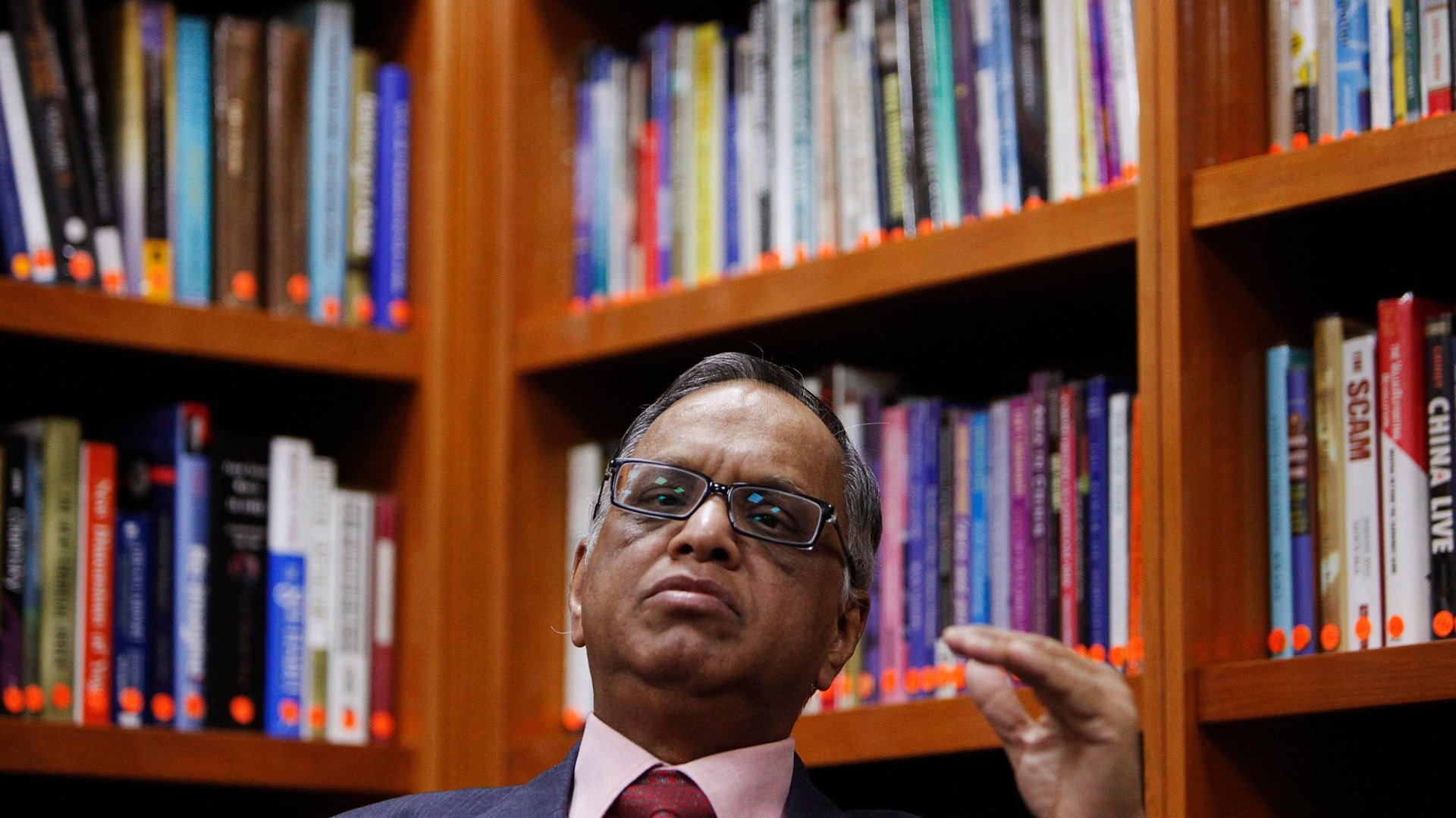Two of India’s top tech leaders want young workers to pull 70-hour workweeks
Executives at Infosys and Ola think 15-hour days are perfectly reasonable for the workforce's newest entrants

India’s biggest founders are encouraging the country’s youth to put in an absurdly high amount of hours at work.
Suggested Reading
During the first episode of 3one4 Capital’s podcast “The Record” yesterday (Oct. 26), Narayana Murthy, who founded IT services giant Infosys in 1981, claimed that “India’s work productivity is one of the lowest in the world,” adding that youngsters should “want to work 70 hours a week” to boost the country’s economy. He’s added 10 more hours to the 60-hour workweek he suggested in 2020.
Related Content
Taken literally, the 70-hour figure in a typical 5-day workweek calls for 14 hours of work daily. Even if the number was arbitrary and a loose suggestion, the message was clear: It’s a call to bump up hours on the job significantly.
Bhavish Aggarwal, the 38-year-old founder of Uber’s formidable Indian rival Ola, chimed in on X to back septuagenarian Murthy’s view.
“It’s not our moment to work less and entertain ourselves. Rather it’s our moment to go all in and build in 1 generation what other countries have built over many generations!” the founder, who started his company in 2011, posted.
More hours don’t translate to better work
The chorus of critics quickly grew, with people warning against an “abusive and toxic” environment with next-to-no work-life balance.
Especially because longer hours don’t translate to better output—research suggests productivity declines after 50 hours, and goes into freefall after 55—and founders would rather pick quality over quantity.
“Boosting productivity isn’t just about working longer hours. It’s about getting better at what you do —upskilling, having a positive work environment and fair pay for the work done,” upGrad founder Ronnie Screwvala, founder of ed-tech platform UpGrad, wrote on X.
Working too long is also takes a toll on physical health. When a person consistently works 55 hours or more per week, that person’s risk of a stroke and heart disease increase by 35% and 17% respectively, compared to working an average of 35-40 hours per week, as per the World Health Organization.
Places of interest: Germany, Japan
In encouraging Indians to work longer hours, Murthy cited the example of German and Japanese workers in the post-World War II era. While a boost in economy due to an uptick in work hours may have been briefly true, it’s an extreme example—and it’s a thing of the past.
Today, the law in Germany won’t allow people to work more than 48 hours a week, including overtime, and it establishes strict rules around breaks and rest. At companies with more than 15 employees, workers can ask to reduce their weekly work hours after six months on the job. Plus, managers are asked to refrain from calling and emailing employees after hours.
In 2018, Japan, which has one of the world’s most famously overworked populations, put a policy in place to fight “karoshi,” or death from overwork, placing similar caps on regular and overtime work.
As a bonus example—in the UK, where Murthy’s son-in-law Rishi Sunak holds the post of prime minister, the workweek is also capped at 48 hours.
Quotable: A 70-hour workweek should be the exception, not the rule
“70-hour workweek, as a rule, is crap. Has only led to burnout for me/my team in the past. Ultimately execution, relationships suffered. Exceptions are fine: When there is a deadline or backlog that needs to be cleared once in a while - with a nice break later. But not as a culture.”
— Mahavir Chopra, founder of insurance tech platform Beshak
What about the work outside the workplace?
This kind of a move would weigh especially heavily on women—who typically bear the brunt of household chores like cleaning, washing dishes, doing laundry, preparing meals, caring for children and elderly relatives, and more.
One study quantified the time women spend on such work daily at 7.2 hours on average (versus just 2.8 hours for men). Sticking to Murthy’s suggestion, after a 14-hour workday and 7 hours of domestic duties, women will have about 3 hours left to eat, sleep, and chill.
“Men are never going to share the load of housekeeping, caregiving and childrearing. With a 70 hour workweek, women will have no choice but to drop out,” one X user rued.
India’s youth seeking better jobs, by the digits
23.22%: India’s youth unemployment rate—those between the ages of 15 to 24 who are unemployed but actively seeking a job—in 2022, as per World Bank data. It was higher than neighbors Pakistan (11.3%), Bangladesh (12.9%), and Bhutan (14.4%).
42.3%: Graduates under the age of 25 who are unemployed in India, as per the “State of Working India 2023" report released last month by Azim Premji University’s Centre for Sustainable Employment. The researchers suggest this could be because more educated workers aren’t able to find roles that fulfill their ambitions and wage requirements, or that they come from households where parents are still able to support them.
Rs3.5-3.8 lakh ($4,205-4,565): Starting salary for fresh graduates in India’s IT sector. “The IT industry has been exploiting freshers for the last ten years. There has been no increase in compensation, freshers are being paid the same...which the companies were paying in 2008-09,” Mohandas Pai, a former Infosys director, lamented last year.
